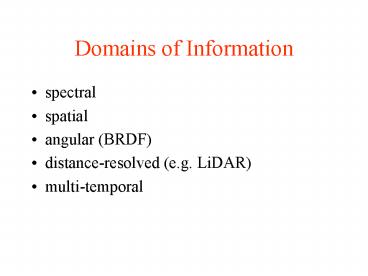Domains of Information - PowerPoint PPT Presentation
1 / 49
Title:
Domains of Information
Description:
fly aiborne LIDAR regularly for high resolution DEM. use first/last return ... doesn't work well (for height) if change between images. wind in forests ... – PowerPoint PPT presentation
Number of Views:13
Avg rating:3.0/5.0
Title: Domains of Information
1
Domains of Information
- spectral
- spatial
- angular (BRDF)
- distance-resolved (e.g. LiDAR)
- multi-temporal
2
EM Radiation
- emitted, scattered or absorbed
- energy out energy in scattering energy
emitted - intrinsic properties (emission,
scattering/absorption) - vary with wavelength
- vary with physical / chemical properties
- can vary with view angle
3
(No Transcript)
4
EM Spectrum ( atmospheric transmission)
5
Plancks law - intensities of radiation
(radiances) as a function of wavelength for
materials with different T
6
Spectral reflectance
- Related to
- how much (illuminated) material (seen)
- reflectance / absorptance characteristics of
materials - ( multiple scattered effects)
7
(No Transcript)
8
(No Transcript)
9
(No Transcript)
10
(No Transcript)
11
Leaves
- Absorbtance by leaf pigments, water etc
- Acting in different parts of the spectrum
12
(No Transcript)
13
(No Transcript)
14
Leaves Factors affecting reflectance/transmittanc
e of plant elements
- pigment type/concentration
- e.g. Chlorophyll a,b - absorb visible radiation
- surface features
- hairs, spines, veins, cuticular wax - scattering
(e.g. specular) - cell morphology and content
- NIR - high refl. due to scattering at
refractive index discontinuities
(nair 0 ncell1.47) - MIR - water absorption features
15
- So attempt to take RS measurement and relate to
- cover type
- different spectral properties)
- amount of material (eg vegetation)
- eg leaf
- high NIR, low visible (basis of VIs)
16
Interpretation complicated by
- variations in Sun/view angle
17
Directional Information
- Describe directional reflectance by BRDF
- Bidirectional Reflectance Distribution Function
- e.g. plot as function of view zenith angle
18
Directional Information
19
Features of BRDF
- General upwards bowl shape for most biomes
- retro-reflectance peak (hot spot)
20
Directional Information
21
Features of BRDF
- Bowl shape
- increased scattering due to increased path length
through canopy
22
Features of BRDF
- Bowl shape
- increased scattering due to increased path length
through canopy
23
(No Transcript)
24
Features of BRDF
- Hot Spot
- mainly shadowing minimum
- so reflectance higher
25
(No Transcript)
26
Use of directional information
- Parameterisation of surface conditions
- build model of physics of effect of surface
properties on reflectence - invert model against RS BRDF measurements
27
Distance-resolved
- Can determine distance from satellites
- based on time-delay of signal
28
Distance-resolved
- Can determine distance from satellites
- based on time-delay of signal
29
Distance-resolved
- eg GPS
30
Distance-resolved
- EO example
- radar interferometry
31
Distance-resolved
- EO example
- radar interferometry
- assume know satellite position
(¾½)x360 315 degrees
¾ way through
270 degrees
2 x d1 (N1(¾½))x5.6
(360 degrees, 2? radians)
32
Distance-resolved
- EO example
- radar interferometry
2 x (d2 - d1) (N2- N1) x 5.6 ((¾½)-0) x 5.6
0 way through
2 x d2 (N2) x 5.6
33
Distance-resolved
- EO example
- position 1
- 2 x (d2 - d1) (N2- N1) x 5.6 ((¾½)-0) x 5.6
- position 2
- point on ground next to current point will have
different phase change - if its within the same cycle (height change less
than 5.6cm) - can tell relative height change between these
points - very precise (mm)
34
Shuttle Radar Topography Mission
35
Shuttle Radar Topography Mission
11 Feb 2000 (Endeavour) - 11 days 30m DEM of /-
60 degrees latitude
36
(No Transcript)
37
(No Transcript)
38
(No Transcript)
39
Distance-resolved
Measure small change - subsidence
40
Distance-resolved
Measure small change - earthquake
41
Distance-resolved
RADAR
RAdio Detection And Ranging
LIDAR
LIght Detection And Ranging
42
Distance-resolved LIDAR
- Send laser pulse from sensor
- measure round trip time
- 2x distance
- use NIR mostly
- atmospheric effects minimised
43
Distance-resolved LIDAR
- Examples - EA
- fly aiborne LIDAR regularly for high resolution
DEM - use first/last return
- ground height / tree height
44
Distance-resolved - LIDAR
45
Distance-resolved LIDAR
- Examples - VCL
- Vegetation Canopy LIDAR
- NASA mission to fly 2000
- waveform LIDAR
46
Distance-resolved VCL
- waveform LIDAR
47
Distance-resolved
- waveform LIDAR
48
LIDAR
- Simple form of measurement
- easy to use (? Simply)
- doesnt work (well) on high slopes
- requires highly-sensitive instrumentation
- potentials for new forms of information
- waveform LIDAR
49
Interferometry
- Used for number of years
- operational (SRTM)
- different scales for different SAR frequencies
- doesnt work well (for height) if change between
images - wind in forests
- doesnt work on high slopes































